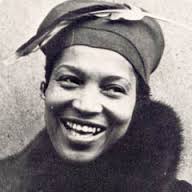Hurston, Zora Neale. Dust Tracks on a Road (New York: Harper Perennial Modern Classics, 2006).
This is one of the most wonderful books I’ve read recently.
Curiously, I have to thank Google, the internet searching giant, for bringing Dust to my attention. The folks at this prosperous IT Corporation recently had the guts and foresight to feature the author’s image on their famously starchy-white main page that spells out “Google,” each letter always appearing in the whimsical tones of green, red, and blue but on special occasions each letter gets redrawn and re-colored in a way to emphasize a certain event or date, in this case, perhaps the author’s birthday anniversary, Zora Neale Hurston’s.
She was a Black American woman and so when I noticed her image on the Google main page with each letter shaded and reshaped in browns and tans I gave way to my curiosity and soon learned that she was a celebrated author.
To be more exact, she is a distinguished but controversial African American woman author who reached the height of her creative writing ability in the 1940s-1950s. If you’re a person who studied and learned anything about American society over the last fifty years or so you might have responded as I did: “What!!! A well-known, Black American woman author, reaching so high in the literary world back in the days of Jim Crow?!?!” Indeed, that’s the kind of pioneer Zora Neale Hurston turned out to be. But, there’s much more to her story and I won’t even try to cover all the bases here even though my reading of Zora triggered me to keep many notes but I intend to merely highlight my strongest impressions here.
Dust Tracks on a Road corresponds to her autobiography. Originally published in 1942 I happened to have gotten a hold of this recent 2006 edition. Incidentally, I love the title she chose for it, reflective of her remarkable linguistic ability and imagination, suggesting that she considered her life (our lives, indeed!) like a trail in the dust waiting for the wind to blow it away. She claims to have written Dust, or most of it, in southern California in 1941, a good time for her, although she lived most of her life on the East coast. I felt somewhat embarrassed to have discovered her via the Google search page, since I’ve spent many hours reading and reflecting on the American past, but there may be a reason to alleviate my slight discomfort.
I took great pleasure in learning about her life, born in southern Florida in 1891 and deceased in 1960, because she wrote about it employing captivating and delightful language written in what appeared to be a fully honest and disarming manner. Political correctness, even in the 1940s, seems to have been anathema to her soul because her guileless remembrances of herself and her own kin and friends, all impoverished and illiterate Black folks living in small Florida towns, appeared consistent with my own understanding of comparable times and places. She uses the word Negro throughout her autobiography. She did not mind what White folk would later think of her social background because she knew, and she affirms this many times, that ignorance may be a blessing of sorts but it is hardly monopolized by dark skinned people. One example of this kind of thinking is that she was brave enough to give credit to a White neighbor farmer who “grannyed her,” or mid-wifed her, and later, when she was about nine, helped her think positively of herself when her own father or grandmother would not.
Assertions of this kind (that not all Whites in her life were racists) appear with some frequency in her autobiography. Her views would have been sharply criticized by young Blacks in the 1960s, a time, as we all know when American Blacks struggled heroically in the late 1950s and 1960s against racism and discrimination. They undoubtedly would have disapproved of her spending more ink on paper exposing rustic chaw-bacons from back country Florida than assailing the bigotry of all White folks.
This may explain why her many books were most probably overlooked by the rising Black teachers and professors after 1960—and it may explain why I didn’t hear of her until I happened to open the Google page already mentioned.
Zora is a gem because she lets us in on the diversity of the Black experience in America. Her unabashed willingness to look at her folks and neighbors through anthropological lenses, and her zest in enlightening the reader of what life taught her in those days concerning human beings and the universe we live in, makes her a prize. Big time publishing houses lost no time in printing her work. It seems however that modern-day Blacks find themselves compelled to walk on egg shells when discussing her and her work.

